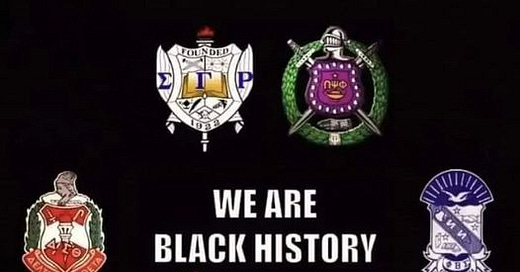Today In Black History: Who Are The Divine Nine?
They are the Nine Historically Black Fraternities and Sororities
Issue #699 Today In Black History, Monday, August 12, 2024
Did you know you can listen to each “We Are Speaking” post on the Substack App? Download the app!
Help us to reach our August 2024 goals: +250 total new subscribers, including +100 new paid subscribers:
Please share and subscribe to help us grow our publication.
Who are your “Fav Five” who would enjoy “We Are Speaking?” Send them the link!
If you like us, REALLY like us, please click the “Like” button at the end of this post!
We appreciate your support!
When we fight, we WIN!
Today’s Black History WOW!
You have most likely heard that Vice President Kamala Harris, a graduate of HBCU Howard University in Washington, D.C., is a member of Alpha Kappa Alpha Sorority, a Black Greek Letter Organization (BGLO).
Associate Supreme Court Justice Ketanji Brown Jackson is a member of Delta Sigma Theta Sorority, which is also a BGLO.
It is important to remember that the organizations themselves are non-profit and non-partisan, so any statement you might see supporting one candidate or another for any political candidate is only the opinion of that member, not the organization as a whole.
Like most fraternities and sororities, the names of BGLOs are taken from the Greek alphabet. The usage of Greek letters in the names of fraternities and sororities is a tradition that dates back to the founding of the first Greek-letter society in the United States, Phi Beta Kappa, in 1776 at the College of William and Mary. This organization was initially created as a literary society but evolved into an honor society. The adoption of Greek letters was intended to reflect the classical education that many of the founding members valued highly, as Greek and Latin were considered the languages of educated individuals at the time.
Collectively, the five historically Black fraternities and historically Black four sororities, also known as the Divine Nine or the “D9,” are part of the National Pan-Hellenic Council (NPHC), established in 1930 to foster unity and cooperative action among Black Greek Letter Organizations. Known for their unwavering commitment to academic excellence, civic engagement, and community service, the Divine Nine remain pillars of strength and progress within the African American community.
BGLOs have both collegiate and graduate chapters. Each collegiate chapter is overseen by a nearby graduate chapter and is not meant to be primarily a social club-type organization. Instead, the Divine Nine collegiate chapters provided a network of support and fellowship among African American students during a time when they were excluded from many mainstream collegiate activities and organizations due to racial segregation.
People can be invited to join a BGLO at either the collegiate level or the graduate level.
You may see or hear some of the “fun” things members of the Divine Nine do, such as dances and step shows, unique hand signals, specific colors, or good-natured competition between the fraternities and the sororities.
The Divine Nine:
Alpha Phi Alpha Fraternity, Inc. (ΑΦΑ): Black and Gold
Alpha Kappa Alpha Sorority, Inc. (ΑΚΑ): Pink and Green
Kappa Alpha Psi Fraternity, Inc. (ΚΑΨ): Red and White
Omega Psi Phi Fraternity, Inc. (ΩΨΦ): Purple and Gold
Delta Sigma Theta Sorority, Inc. (ΔΣΘ): Crimson and Cream/Red and White
Phi Beta Sigma Fraternity, Inc. (ΦΒΣ): Blue and White
Zeta Phi Beta Sorority, Inc. (ΖΦΒ): Blue and White
Sigma Gamma Rho Sorority, Inc. (ΣΓΡ): Blue and White
Iota Phi Theta Fraternity, Inc. (ΙΦΘ): Brown and Gold
Historical Significance
Historical Context: The Divine Nine BGLOs were founded at a time when African Americans faced severe racial segregation and limited access to higher education and social organizations. These fraternities and sororities created a safe space for African American students to gather, support each other, and advocate for civil rights.
Leadership and Activism: The organizations were founded on principles of scholarship, leadership, and service to the community. They have historically been involved in civil rights movements and other social justice causes, providing a collective voice to their members.
Social and Academic Support
Networking: The bonds formed within these organizations create a powerful network of support that extends far beyond college years. Members have access to a wide network of alumni who can provide career mentorship, job opportunities, and professional development.
Academic Excellence: BGLOs often emphasize academic achievement among their members, providing tutoring, scholarships, and academic resources to ensure that members excel in their studies.
Cultural Identity and Unity
Cultural Pride: Fraternities and sororities offer a platform for African American students to celebrate their heritage and foster a sense of pride in their cultural identity. This is particularly significant in predominantly white institutions where they may feel isolated.
Rituals and Traditions: The traditions and rituals of these organizations help to create a strong sense of belonging and continuity. Events, step shows, and other cultural expressions are integral parts of the BGLO experience.
Community Service
Service Projects: BGLOs are heavily involved in community service and philanthropic efforts. They organize and participate in a variety of service projects that address issues such as poverty, education, health disparities, and social injustice in the African American community.
Role Models: Members of these organizations often serve as role models for younger generations, demonstrating the importance of education, community involvement, and leadership.
The D9:
Alpha Phi Alpha Fraternity, Inc.
Founded on December 4, 1906, at Cornell University, Alpha Phi Alpha (ΑΦΑ) is the first intercollegiate historically African American fraternity and the largest. The fraternity's motto, "First of All, Servants of All, We Shall Transcend All," underscores its mission to develop leaders, promote brotherhood and academic excellence, and provide service and advocacy for communities.
Alpha Kappa Alpha Sorority, Inc.
Established on January 15, 1908, at Howard University, Alpha Kappa Alpha (ΑΚΑ) is the first Greek-lettered sorority established and incorporated by African American college women. With the guiding principle of "Service to All Mankind," AKA has a history rich in activism and philanthropy, addressing issues ranging from educational inequities to health disparities.
Kappa Alpha Psi Fraternity, Inc.
Originating at Indiana University on January 5, 1911, Kappa Alpha Psi (ΚΑΨ) seeks to uplift African American men through fellowship, academic achievement, and service. The fraternity's motto, "Achievement in Every Field of Human Endeavor," speaks to its commitment to fostering success across all areas of life.
Omega Psi Phi Fraternity, Inc.
Founded on November 17, 1911, at Howard University, Omega Psi Phi (ΩΨΦ) is known for its dedication to "friendship is essential to the soul." The fraternity has been a steadfast advocate for its communities, with programs focused on health initiatives, voter registration, and educational support.
Delta Sigma Theta Sorority, Inc.
Delta Sigma Theta (ΔΣΘ), the largest Divine Nine Sorority, was established on January 13, 1913, by 22 collegiate women at Howard University. The sorority is dedicated to public service, with an emphasis on programs that target the Black community. Social advocacy and the promotion of educational and economic development are central to Delta's mission. The mottos are “Intelligence is the Source of Wisdom” and “Forward with Fortitude.”
Phi Beta Sigma Fraternity, Inc.
On January 9, 1914, Phi Beta Sigma (ΦΒΣ) was created at Howard University, underscored by the principles of brotherhood, scholarship, and service. The fraternity prides itself on its inclusive model, fostering a sense of brotherhood among all races, and its relentless work in every sector of society.
Zeta Phi Beta Sorority, Inc.
Also founded at Howard University, Zeta Phi Beta (ΖΦΒ) was established on January 16, 1920. The sorority promotes a mission of "Finer Womanhood" and is distinguished by its pioneering efforts in social causes, including partnerships with national and international organizations for community upliftment.
Sigma Gamma Rho Sorority, Inc.
Sigma Gamma Rho (ΣΓΡ) was founded on November 12, 1922, at Butler University in Indiana by seven educators. The sorority emphasizes "Greater Service, Greater Progress" through dedication to improving the quality of life within communities via public service, leadership development, and education.
Iota Phi Theta Fraternity, Inc.
The youngest of the Divine Nine, Iota Phi Theta (ΙΦΘ) was founded on September 19, 1963, at Morgan State University during the height of the Civil Rights Movement. Rooted in "Building a Tradition, Not Resting Upon One," Iota Phi Theta focuses on advocacy and leadership within the African American community.
Conclusion
The Divine Nine BGLOs offer more than just a social experience; they provide a network of support, a source of cultural pride, a platform for service, and a springboard for leadership and professional success. These organizations' contributions are ongoing and continue to be a vital part of African American history and culture.
Today In Black History
In 1890, the Mississippi Constitutional Convention started systematically excluding Black political participation in the South.
In 1922, the home of Frederick Douglass in Washington, D.C., was declared a national shrine.
In 1965, Jonathan M. Daniels, a white Episcopal seminary student from Massachusetts, who was participating in a civil rights demonstration, was killed by a shotgun blast by a white special deputy sheriff in Hayneville, Alabama.
In 1990, August Wilson’s second play, “The Piano Lesson,” won the Pulitzer Prize for Drama. Wilson also won the Pulitzer Prize in 1981 for his play “Fences."
Our paid subscribers are encouraged to discuss this post in our W.A.S. Chat Community.
Join Pamela Hilliard Owens’s subscriber chat
Available in the Substack app and on the web
You are also welcome to view “We Are Speaking” in Substack Notes. You can also read other Substack publications without subscribing to them when you join Notes.







